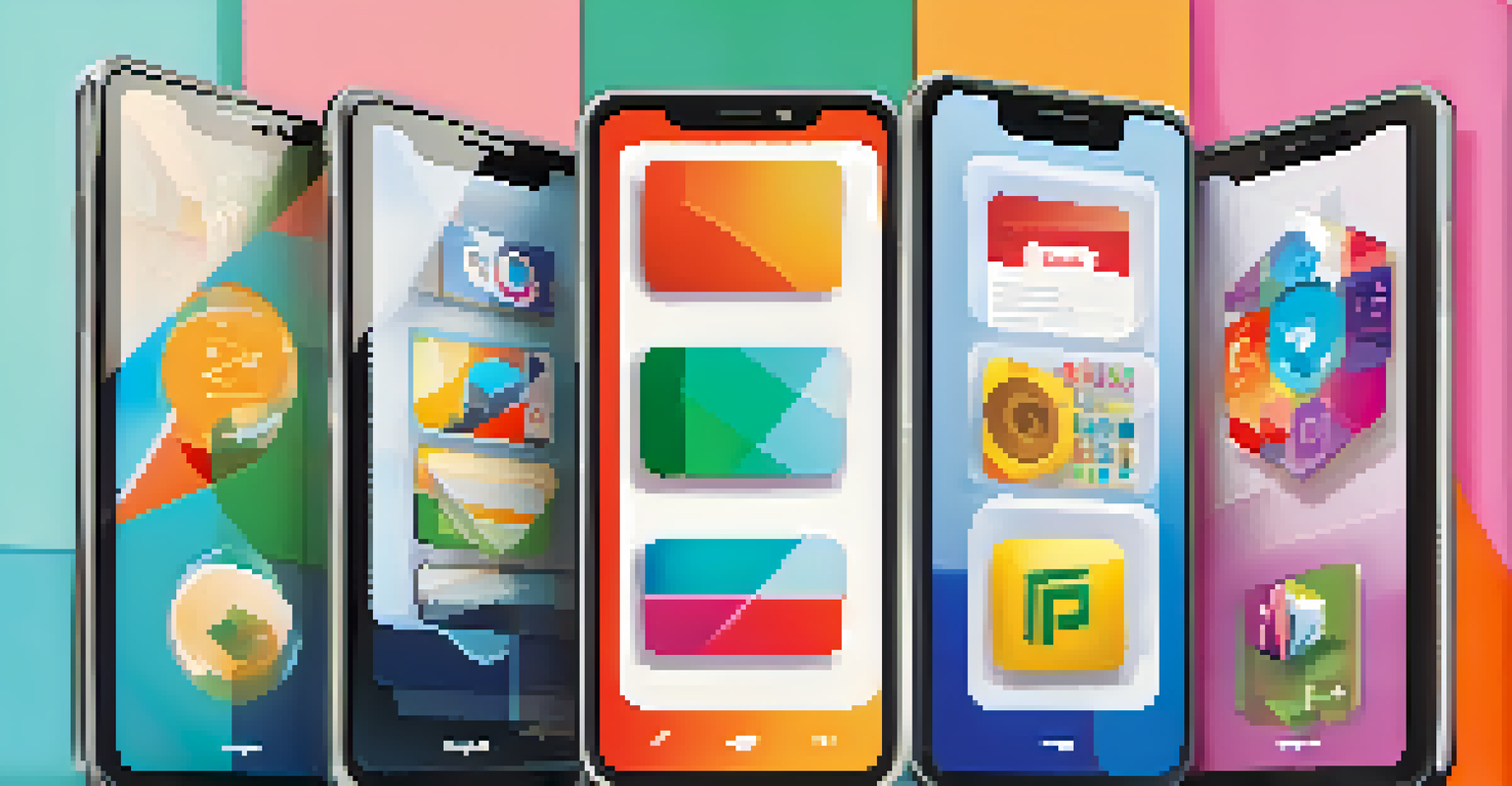Mobile Learning for Critical Thinking: Enhancing Analytical Skills

Understanding Mobile Learning and Its Importance
Mobile learning refers to education that takes place via mobile devices, allowing users to learn anytime, anywhere. This flexibility makes it increasingly popular among learners who juggle multiple responsibilities, such as work and family. By integrating mobile learning into their routines, individuals can access educational resources on the go, fitting learning into their busy lives.
The future belongs to those who learn more skills and combine them in creative ways.
But why is mobile learning particularly important for developing critical thinking skills? The answer lies in its interactive nature. Mobile learning often employs quizzes, simulations, and discussion forums, which encourage learners to engage actively with the material, fostering a deeper understanding and analytical mindset.
Moreover, mobile learning promotes self-directed learning, a key component of critical thinking. When learners take control of their educational journey, they become more adept at analyzing situations, evaluating information, and making informed decisions—all essential skills in today’s fast-paced world.
The Role of Technology in Enhancing Critical Thinking
Technology plays a crucial role in shaping how we learn and think critically. With the myriad of apps and platforms available, learners have access to a wealth of information at their fingertips. This abundance of resources encourages users to sift through data, discern credible sources, and evaluate differing viewpoints.

For instance, mobile learning tools often use gamification elements, transforming traditional learning into engaging challenges. These interactive experiences not only make learning fun but also require learners to strategize and solve problems, honing their analytical skills in the process.
Mobile Learning Enhances Flexibility
Mobile learning allows individuals to learn anytime and anywhere, fitting education into busy lifestyles.
In addition, technology facilitates collaboration among learners. Through mobile apps, students can easily connect with peers, share insights, and participate in group discussions, which broadens their perspectives and enhances critical thinking capabilities.
Mobile Learning Strategies for Developing Analytical Skills
To effectively cultivate analytical skills through mobile learning, it’s essential to adopt specific strategies. First, learners should utilize apps that promote critical thinking exercises, such as logic puzzles and case studies. These activities challenge users to think deeply and analyze various scenarios, sharpening their analytical abilities.
Education is not the filling of a pail, but the lighting of a fire.
Second, engaging with educational podcasts and videos can serve as a powerful supplement. These resources often present complex topics in an accessible format, prompting listeners to evaluate arguments and form their own conclusions. This kind of active engagement is vital for developing critical thinking skills.
Lastly, learners should consider setting goals for their mobile learning journey. By outlining what they want to achieve, they can focus their efforts on resources that enhance their analytical skills, creating a more structured and effective learning experience.
Creating a Mobile Learning Environment that Encourages Thinking
A conducive mobile learning environment is key to fostering critical thinking. This involves curating a selection of high-quality resources that challenge learners to think critically. For example, including articles that present multiple viewpoints on a topic can encourage users to analyze and form their own opinions.
Additionally, it’s essential to incorporate tools that allow for reflection and discussion. Whether through mobile forums or comment sections, providing a space for learners to express their thoughts can stimulate deeper analysis and encourage collaborative learning.
Technology Boosts Critical Thinking
Interactive tools and collaborative platforms in mobile learning promote engagement and analytical skills.
To further enhance this environment, learners should be encouraged to explore and question the information they consume. This mindset of inquiry is foundational for developing robust analytical skills, enabling learners to navigate the complexities of information they encounter.
Challenges in Mobile Learning for Critical Thinking
While mobile learning offers numerous benefits, it’s not without its challenges. One significant hurdle is the potential for distraction. With social media and entertainment apps vying for attention, learners may struggle to stay focused on educational content, which can hinder critical thinking development.
Moreover, the overwhelming amount of information available can lead to analysis paralysis. Learners might find it difficult to decide which sources are credible or relevant, causing frustration and diminishing their analytical capabilities. It’s important for learners to develop skills in filtering and evaluating information effectively.
Lastly, not all mobile learning resources are created equal. Some may lack depth or rigor, which can impede the development of critical thinking skills. Therefore, learners need to choose their resources wisely and seek out those that genuinely challenge them to think critically.
The Future of Mobile Learning and Critical Thinking
As technology continues to evolve, the future of mobile learning looks promising, particularly for critical thinking development. Emerging technologies like artificial intelligence and virtual reality have the potential to create personalized learning experiences that adapt to individual needs, enhancing engagement and analytical skills.
For example, AI-driven apps can analyze a learner's strengths and weaknesses, offering tailored exercises that focus on areas needing improvement. This personalized approach fosters a more effective learning process, allowing users to develop their analytical skills at their own pace.
Strategies for Analytical Skill Growth
Utilizing targeted apps, podcasts, and goal-setting can effectively enhance analytical skills through mobile learning.
Moreover, the integration of collaborative tools in mobile learning platforms will likely expand. As learners increasingly work together, they can share diverse perspectives and challenge each other’s thinking, ultimately enhancing their critical thinking abilities.
Conclusion: Embracing Mobile Learning for Critical Thinking
In conclusion, mobile learning presents a unique opportunity to enhance critical thinking and analytical skills. With its accessibility and interactive nature, learners can engage with educational content in a way that fits their lifestyle, making learning a seamless part of their daily routine.
By understanding the role of technology and implementing effective strategies, individuals can harness the power of mobile learning to develop their analytical skills. This journey involves not only consuming information but actively engaging with it, questioning assumptions, and analyzing various perspectives.

Ultimately, as we embrace mobile learning, we equip ourselves with the critical thinking skills necessary to navigate an increasingly complex world. It’s time to take advantage of the tools at our disposal and foster a mindset of inquiry and analysis that will serve us well in all aspects of life.